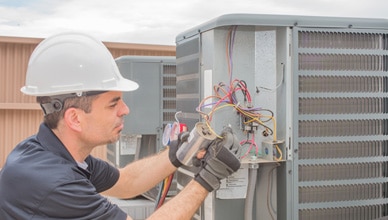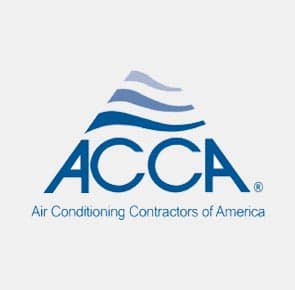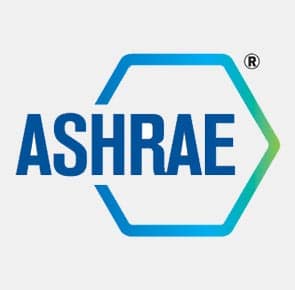University Headquarters (HQ) is an industry-leading, independent educational organization that provides independent college rankings using a proprietary formula to create first class unbiased rankings. The team at University HQ strives to provide accurate and trustworthy rankings that highlights the best educational programs for HVAC contractors.
Compare Popular Online Heating Cooling Programs
What Does an HVAC Career Entail?
As an HVAC technician, that is a heating and air conditioning mechanic, you’ll install, troubleshoot, and repair heating and cooling systems, including domestic refrigeration systems and commercial refrigeration systems. These skilled trade professionals may deal with heating, ventilation, air conditioning, and refrigeration technologies. Customers could be homeowners, business owners, or government entities. As an air conditioning mechanic or HVAC technician, you’ll diagnose problems with old-fashioned mechanical control systems and newer programmable control systems after asking the customer a series of questions regarding the issue. Once you have that information, you can inspect the unit and attempt to pinpoint the issue. Once you’ve determined the problem, you present the customer with a solution and an estimate for the cost of the repair, whether than includes simple maintenance or replacement of all temperature control equipment. If the customer agrees, you order parts as needed and start to repair the unit. You might also be called upon to help a customer determine the right size unit for their home. This is done by examining the layout of the home, finding out which rooms will be connected to the system and matching this criterion with the overall climate surrounding the home.
Various excellent employment opportunities throughout the HVAC industry require certain industry certifications if you expect to get the job. Many of these industry certifications are available only through the Environmental Protection Agency(EPA), which requires hands-on training and the passing of exams. Type I covers small appliances, heating and air conditioning technology, and domestic refrigeration systems. Type II, HVAC-R, covers high-pressure appliances, heating, air conditioning, and refrigeration technologies. Type III is for low pressure appliances and chillers. And the Universal certification covers all of the above.

Components of A Successful "HVAC Career"
Once you earn an Associate of Applied Science in Heating, Ventilation, and Air Conditioning (HVAC-R), you’ll be ready to work for companies that offer HVAC-R services. Contractors may need a refrigeration & HVAC technician for new construction and renovations that are incorporating new heating, ventilation, and air conditioning systems. You’ll also find work repairing and replacing existing equipment in both residential and commercial refrigeration settings. Depending on your geographic location, the predominate system can vary, so being knowledgeable about the entire HVAC system is ideal because it makes you more versatile than someone who knows how to fix air conditioners or furnaces but not both.
Get Matched With Heating Cooling Programs
How to Become an HVAC Technician
What Does an HVAC Technician Do?

What is the Difference Between HVAC and Air Conditioning?
The difference between HVAC and air conditioning is that an HVAC system is more complex. With an air conditioner, you are dealing with a unit used to cool a home during warm months. The unit might be small, fitting in a window; or large, installed outside the home. A Heating, Venting, and Air Conditioning unit (HVAC) not only provides air conditioning, but heating and ventilation as well. The air conditioning and heat are distributed throughout the structure through a series of vents that go to each room. The HVAC system is generally a larger unit that is installed outside the home, either in a side or back yard.
Trade School Requirements
To apply for admission to a HVAC training trade school, a student should have a high school diploma or GED. Depending on the institution, an ACT or SAT exam score might be required.
Typical HVAC Certifications Needed

Academic Standards
Students enrolled in an HVAC training degree or certification program will have to demonstrate understanding of the courses taught by achieving passing grades in all required classes, including major classes and general requirement courses. Once all courses are taken and passed, the student is prepared to take specific certification classes and exams in whatever area of HVAC they choose to explore.
Exam and Experience Needed for Certification
No prior experience is required to start an HVAC training program past the desire to learn how to install, troubleshoot, and repair the equipment. Some two-year schools might require potential students to take the ACT or SAT exams or complete a skills assessment for English and math placement.
HVAC Degree & Certification Options
Here are the main types of HVAC Training programs:
- Certificate in Heating Venting and Air Conditioning
This program takes between six months and a year to complete. During the program, students will learn about HVAC system and design, residential and light commercial systems, electrical systems, and refrigeration systems. At the end of the program, students will be ready to start an entry level position in the HVAC industry. - Associate of Applied Science in Heating Venting and Air Conditioning
This is a two-year program that covers everything the certificate program covers, but in more depth and with additional focus on physics, metal fabrication, heat pumps, and electrical system design. Graduates will be ready to work as a HVAC tech and do a variety of jobs from fabrications to installations and repairs.
Certificate of HVAC Cost
The price of these certificates varies by institution, but tuition, books, and fees for a certificate program at one technical college was $6,300 for in-state students and $7,500 for out-of-state students. The two-year program will cost roughly double that amount, so $12,600 for in-state students and $15,000 for out-of-state students.
Potential Careers & Salaries for HVAC Graduates
An HVAC technician with an associate degree might enjoy increased pay because the extra year of school provided education in areas that the certificate program does not address. That said, the biggest determiner for pay in this field is experience.
HVAC Tech Median Salaries by Occupation
Annual Median Salary by Occupation
| Occupation | Entry-Level | Mid-Career | Late-Career |
|---|---|---|---|
| HVAC Technician | $40,100 | $48,500 | $56,200 |
| HVAC Installer | $33,000 | $46,000 | $50,000 |
| HVAC Refrigeration Technician | $32,700 | $60,000 | $63,100 |
Important Questions to Ask (FAQ)
How long does it take to earn a HVAC Degree or Certification?
Students can earn a certificate in HVAC in 10 months to a year, depending on the online program. For students who wish to obtain an Associate in Applied Science degree, the process takes two years. If you’re considering going into a supervisory or managerial role, a bachelor’s degree in HVAC takes up to four years. All of these degrees required on-the-job training.
How much does an online HVAC Trade School Degree cost?
Attaining a HVAC certificate will cost between $3,500 and $6,000 depending on the school. Those seeking a two-year degree in HVAC can expect to spend between $7,000 and $12,000, also depending on the school.
How many students graduate “on time,” in 12 months or 24 months?
The graduation rate for four-year institutions hovers around 50%, and that percentage is even lower for two-year programs. Certificate programs fare slightly better because they don’t require as large a time commitment and students can attain employment more quickly.
What kind of accreditation does the online program hold? How is it regarded in the field?
Choosing an accredited online program is important because many employers will only hire graduates from programs that hold accreditation. Regional accreditation for both the school and the program is ideal. Schools that offer two-year and certificate programs are often regionally accredited. Regional accreditation will come from one of 6 accreditation agencies; the Higher Learning Commission, the middle States Commission on Higher Education, the New England Association of Schools and Colleges, the Northwest Commission on Colleges and Universities, the Southern Association of Colleges and Schools, and the Western association of Schools and Colleges. As for the HVAC programs themselves, there are two main accrediting organizations, HVAC Excellence and the Partnership for Air-Conditioning, Heating, Refrigeration Accreditation (PAHRA). You’ll want to select a program that holds these accreditations.
Find Online Heating Cooling Schools
Software, Technology & Skills Needed
As a HVAC tech you’ll need several skills while you’re on the job.
- Eye for details
- Effective communication skills
- Organization skills
- Math skills for measurements and equations
- Ability to run various machines and equipment
HVAC Training Trade School Scholarships
-
The American Society of Heating, Refrigeration and Air-Conditioning Engineers (ASHRAE)
Amount: Up to $10,000
Deadline: May 1; November 15
ASHRAE provides scholarships for students who plan to pursue a career in HVAC. They provide up to $10,000 in scholarship money each year. Both the national and regional branches of ASHRAE offer scholarships and there are school-specific and high school awards available as well. To qualify, students must be enrolled or planning to enroll in an ASHRAE-approved program and meet other eligibility requirements.
-
Thermaxx Jackets Scholarship
Amount: $1,000
Deadline: May 31
Students with a 2.5 GPA who submit a 250-word essay are eligible to apply for the $1,000, one-time scholarship. It is available through Thermaxx, LLC and is for trade school students who are pursuing HVAC programs.
-
Rees Scholarship Foundation
Amount: Varies
Deadline: June 1 (Fall); October 1 (Spring)
The Rees Scholarship Foundation offers several scholarships to those interested in joining the HVAC industry. Most of the scholarships require school transcripts, and essay, and letters of recommendation.
Professional HVAC Organizations
- AMCA
- ACCA
- ASHRAE

AMCA
Air Movement and Control Association
This organization helps shape the atmosphere for those who work in the air control industry. They offer legislation, protection, and education for those who work in the industry. They are at the forefront of design and adaptation of air control equipment having designed many of the units currently in service. A technician who joins the organization must sell AMCA approved equipment, so this organization is ideal for any HVAC tech planning to incorporate unit sales in their career.

ACCA
Air Conditioning Contractors of America
This organization represents contractors, HVAC companies, and customers. Through the “Find a Contractor” service on its website, HVAC techs gain access to a plethora of potential clients. They also offer conferences for managers as well as a large conference for the entire organization annually. Techs can also achieve accreditations and certifications to help them further their careers.

ASHRAE
The American Society of Heating, Refrigeration, and Air-Conditioning Engineers
As the largest and most influential HVAC organization in the country, members enjoy access to education, collaborations, and certification across the HVAC specializations. Members can conduct research regarding a variety of HVAC topics and at the annual conference, technicians can meet with other members and share insight and ideas about the HVAC industry.
Choosing an Accredited HVAC Training Vocational School
It is important that you choose a school with recognized accreditation. Otherwise, all your hard work and money that went into attaining the certificate or degree will have been wasted. In most cases, the school itself will be accredited through one of the 6 regional accrediting agencies and the HVAC program through HVAC Excellence or PAHRA.
Search Programs Offering Heating Cooling Majors
Online vs On-Campus vs Hybrid
Choosing an online program can help many students who might not be able to navigate the traditional college schedule. However, for this type of training, you will likely find that there aren’t programs that offer a 100% online experience. Instead, you may be able to find a hybrid program, which offers both on campus and online courses. This availability varies by school, but more and more colleges are incorporating online course options into their programs.
Additional Questions
Does the Vocational School Have Post-Graduate Job Placement Assistance?
This will depend on the school, but most certificate and two-year programs offer job placement assistance for graduates. It’s an important thing to look for when trying to choose an online program, as a school that has associations with local businesses may be able to get you into a job right after you finish, rather than you spending weeks or months looking for a job on your own.
Why You Need to Consider the Overall National Rankings of the School and The Effects on Your Career or Salary
The rankings of the school you select can have a direct impact of your salary offer and whether or not potential employers feel you’re well trained. Although employers expect a bit of a learning curve, especially when hiring techs right out of college, they also want to know that you came from a program that actually trains technicians. So, along with ensuring the school you choose has proper accreditation, you’ll want to also make sure the school enjoys a decent ranking as well.
